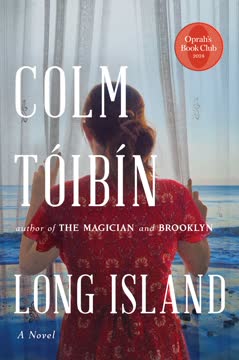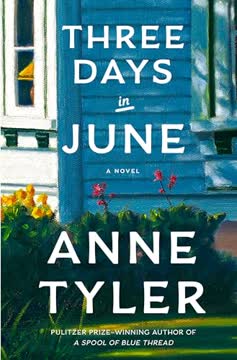Plot Summary
Gardening and Forgotten Lunches
Kate Battista, a practical, sharp-tongued young woman, is interrupted from her gardening by her absent-minded father, Dr. Battista, who has forgotten his lunch. This small domestic crisis sets the tone for Kate's life: she is the responsible one, holding her family together while her father is absorbed in his research and her younger sister, Bunny, floats through adolescence. The family's rhythms are dictated by Dr. Battista's needs and Kate's willingness to fill in the gaps, highlighting her sense of duty and the simmering frustration beneath her surface. The sunny, breezy day contrasts with Kate's internal exasperation, and her walk to the lab introduces the world she inhabits—one of obligation, routine, and unspoken longing for something more.
Lab Encounters and Proposals
At the lab, Kate meets Pyotr Shcherbakov, her father's brilliant but eccentric research assistant, whose visa is about to expire. The encounter is laced with comic misunderstandings and cultural clashes, as Pyotr's bluntness and foreignness unsettle Kate. Dr. Battista's odd behavior hints at a hidden agenda, and Pyotr's admiration for Kate's hair is both flattering and off-putting. The conversation is peppered with scientific banter and Pyotr's peculiar proverbs, setting up the central conflict: Dr. Battista's desperation to keep Pyotr in the country, and the lengths he might go to achieve it. Kate's role as the family's anchor becomes more pronounced, even as she senses she is being maneuvered into something she doesn't understand.
Preschool Chaos and Probation
Kate's job as a preschool assistant is a microcosm of her life: she is competent but unfulfilled, respected by the children but not by their parents or her superiors. Her bluntness and lack of tact put her on probation, and she feels out of place among the more diplomatic staff. The children's squabbles and the petty dramas of the school mirror Kate's own sense of being stuck, unable to move forward or escape her circumstances. Her failed college career and lack of direction haunt her, and her interactions with the children reveal both her impatience and her hidden tenderness. The threat of losing her job looms, adding to her sense of instability.
Family Systems and Sisterly Tensions
At home, Kate manages the household with military precision, following her father's systems for everything from meals to laundry. Bunny, her beautiful and frivolous younger sister, is a source of both irritation and affection. Their mother's absence is keenly felt, and Kate's resentment at being the de facto caretaker simmers beneath the surface. Bunny's adolescent rebellions—her new vegetarianism, her flirtations with the neighbor boy—clash with Kate's practicality. Dr. Battista's obliviousness to the realities of daily life frustrates Kate, who feels unappreciated and taken for granted. The family's dysfunction is both comic and poignant, and Kate's longing for recognition and autonomy becomes increasingly urgent.
The Visa Dilemma Emerges
Dr. Battista reveals the true nature of his anxiety: Pyotr's visa is expiring, and without him, the research project—and perhaps Dr. Battista's career—will collapse. The only solution, he suggests, is for Pyotr to marry an American. The proposal is both absurd and insulting to Kate, who is stunned that her father would consider her as a candidate. The conversation is fraught with misunderstanding and hurt, as Kate realizes she is valued more for her utility than for herself. The ethical and emotional implications of a marriage of convenience are explored, and Kate's sense of agency is challenged. The family's dependence on her is laid bare, and the stakes are raised.
Pyotr's Unconventional Courtship
Pyotr, encouraged by Dr. Battista, begins a clumsy courtship of Kate, marked by awkward compliments, cultural misunderstandings, and a lack of subtlety. Kate is both amused and exasperated by his directness, and their interactions are a dance of resistance and reluctant curiosity. Pyotr's outsider status highlights Kate's own feelings of alienation, and their conversations reveal unexpected common ground. The absurdity of the situation is tempered by moments of genuine connection, as Pyotr's vulnerability and sincerity begin to break through Kate's defenses. The prospect of marriage remains unappealing, but the possibility of change—however unlikely—begins to glimmer.
Kate's Emotional Upheaval
Kate is deeply wounded by her father's proposal, feeling used and unappreciated. Her sense of self-worth is shaken, and she withdraws into herself, nursing her hurt and anger. The world around her seems to move on without her, and she is haunted by memories of her failed ambitions and the limitations of her life. The emotional arc intensifies as Kate grapples with her role in the family and her own desires. The pain of being overlooked and undervalued is palpable, and her struggle to assert herself is both painful and relatable. The chapter ends with a sense of isolation and unresolved tension.
The Marriage Proposition
Dr. Battista, desperate and guilt-ridden, pleads with Kate to consider the marriage, assuring her it will be a mere formality. The conversation is fraught with emotion, as father and daughter confront their mutual dependence and the sacrifices they have made for each other. Kate's resistance is worn down by her father's vulnerability and her own sense of duty. The arrangement is negotiated as a business transaction, with promises of separate bedrooms and no romantic expectations. The ethical ambiguities of the plan are acknowledged, and Kate's reluctant acceptance is tinged with resignation and a faint hope for something more.
Reluctant Acceptance
Kate announces her engagement, navigating the social rituals and expectations that come with it. The reactions of her coworkers, friends, and family range from surprise to skepticism, and Kate feels like an imposter in her own life. The engagement becomes a performance, with staged photographs and invented histories for the benefit of Immigration. Kate's sense of self is further eroded by the charade, and her doubts about the future intensify. The emotional cost of the arrangement becomes clear, as Kate struggles to maintain her dignity and autonomy in the face of mounting pressure.
Engagement and Social Scrutiny
A family dinner brings together the Battistas, Pyotr, and extended relatives, exposing the cultural and generational divides that shape their interactions. Pyotr's foreignness is both a source of fascination and discomfort, and the dinner is marked by comic misunderstandings and subtle power struggles. Kate's aunt Thelma takes charge, planning a reception and imposing her own vision of propriety. The question of where the newlyweds will live becomes a battleground, with Kate asserting her independence and Pyotr supporting her. The shifting alliances and undercurrents of resentment and affection reveal the complexities of family life and the challenges of forging a new identity.
Wedding Day Disasters
On the day of the wedding, everything goes wrong: Pyotr is late, the lab is vandalized, and Dr. Battista is devastated by the loss of his mice. The ceremony is rushed and chaotic, with emotions running high and tempers flaring. Kate's decision to go through with the marriage is an act of defiance and self-assertion, as she refuses to let circumstances dictate her fate. The wedding is both farcical and moving, a testament to the resilience of the human spirit in the face of adversity. The chapter ends with a sense of uncertainty and the possibility of new beginnings.
Mice, Mayhem, and Misunderstandings
The aftermath of the wedding is dominated by the search for the missing mice and the unraveling of misunderstandings. Pyotr's impulsive actions and Bunny's accusations lead to a family showdown, with secrets and grievances laid bare. The resolution comes through a combination of detective work and reluctant cooperation, as the true culprit is revealed and the mice are recovered. The crisis serves as a catalyst for reconciliation and growth, as the characters confront their flaws and learn to forgive each other. The emotional arc reaches a turning point, with the possibility of healing and renewal.
A Marriage of Inconvenience
Kate and Pyotr move into their new apartment, navigating the challenges of cohabitation and the awkwardness of their arrangement. The practicalities of daily life—unpacking, cooking, sharing space—become opportunities for negotiation and compromise. The initial discomfort gives way to moments of genuine intimacy, as Kate and Pyotr begin to understand and appreciate each other's quirks and vulnerabilities. The marriage, though unconventional, offers the possibility of companionship and mutual support. The chapter is marked by small victories and the slow building of trust.
New Beginnings in a Shared Home
As Kate and Pyotr settle into their new life, they discover unexpected pleasures in their routines and shared experiences. Gardening, cooking, and caring for each other become acts of love and affirmation. The support of neighbors and the warmth of their makeshift family provide a sense of belonging and stability. Kate's sense of self is restored, and she begins to envision a future that is both independent and connected. The marriage, once a matter of convenience, becomes a source of comfort and quiet joy.
Reception Revelations
The wedding reception, orchestrated by Aunt Thelma, is a microcosm of the family's complexities and the challenges of blending cultures and expectations. The guests' reactions range from bemusement to genuine affection, and the event is marked by comic mishaps and heartfelt toasts. Kate's sense of being an outsider is tempered by moments of connection and recognition. The public performance of marriage gives way to private understanding, as Kate and Pyotr find their own way of being together. The reception serves as a rite of passage, marking the transition from old patterns to new possibilities.
Sisterly Showdown
A confrontation between Kate and Bunny brings long-standing tensions to the surface, as accusations and resentments are aired. Kate defends her choices and articulates her understanding of the challenges faced by men and women, offering empathy and insight. The argument becomes a moment of catharsis, allowing both sisters to acknowledge their differences and find common ground. The family's wounds are not fully healed, but the possibility of reconciliation and mutual respect emerges. The emotional arc comes full circle, with Kate claiming her voice and her place in the world.
Epilogue: Sandwiches and Settling In
The epilogue offers a glimpse into the future, as Kate and Pyotr's son, Louie, prepares his own supper while his parents prepare for a new milestone. The rhythms of family life continue, marked by small rituals and shared memories. The legacy of love, resilience, and adaptation is passed on to the next generation, and the story ends with a sense of contentment and continuity. The journey from chaos to stability, from isolation to connection, is complete.
Characters
Kate Battista
Kate is the reluctant heroine of the story, a woman whose life is defined by duty, practicality, and a simmering sense of unfulfillment. As the eldest daughter, she shoulders the burdens of her family, managing the household and caring for her absent-minded father and frivolous sister. Kate's bluntness and lack of social finesse set her apart, both at work and at home, and she struggles with feelings of inadequacy and invisibility. Her failed academic career and stalled ambitions haunt her, and she longs for recognition and autonomy. Over the course of the novel, Kate is forced to confront her own desires and limitations, ultimately finding strength in vulnerability and connection. Her journey is one of self-discovery, as she learns to assert herself and embrace the possibility of change.
Pyotr Shcherbakov
Pyotr is Dr. Battista's indispensable research assistant, a Russian scientist whose visa is about to expire. He is both comic and poignant, marked by cultural misunderstandings, blunt speech, and a lack of social graces. Pyotr's vulnerability and sincerity are masked by his eccentricities, but beneath the surface lies a deep longing for belonging and stability. His outsider status mirrors Kate's own sense of alienation, and their interactions are a dance of resistance and reluctant attraction. Pyotr's emotional honesty and willingness to adapt challenge Kate's defenses, and his journey is one of integration and acceptance. Through his relationship with Kate, Pyotr finds a home and a sense of purpose, transforming a marriage of convenience into a partnership of equals.
Dr. Louis Battista
Dr. Battista is the patriarch of the family, a scientist whose devotion to his research eclipses his ability to connect with his daughters. He is both comic and tragic, oblivious to the realities of daily life and dependent on Kate for his well-being. His desperation to keep Pyotr in the country leads him to propose the marriage scheme, revealing both his selfishness and his vulnerability. Dr. Battista's inability to express affection or appreciation is a source of pain for Kate, but his moments of honesty and regret hint at a deeper love. His character embodies the challenges of balancing ambition and family, and his journey is one of belated recognition and reconciliation.
Bunny Battista
Bunny is Kate's younger sister, a beautiful and seemingly superficial teenager whose antics and rebellions provide comic relief and emotional complexity. She is the favored child, indulged by her father and admired by others, but her apparent shallowness masks a keen intelligence and a capacity for empathy. Bunny's relationship with Kate is fraught with rivalry and affection, and her adolescent experiments—vegetarianism, flirtations, and rule-breaking—highlight the generational and temperamental divides within the family. Bunny's role as both foil and confidante to Kate is central to the story's emotional arc, and her eventual support and understanding are crucial to Kate's growth.
Aunt Thelma
Aunt Thelma is the family's matriarchal figure, a woman of strong opinions and social ambitions. She is both a source of support and a source of pressure, orchestrating family events and imposing her own standards of propriety. Her relationship with Kate is marked by both affection and exasperation, and her interventions often complicate rather than resolve conflicts. Aunt Thelma's insistence on tradition and appearances serves as a counterpoint to Kate's pragmatism, and her eventual acceptance of Kate's choices signals a shift in family dynamics.
Uncle Theron
Uncle Theron, Aunt Thelma's twin, is a pastor who officiates at Kate and Pyotr's wedding. He is a calming presence, offering support and understanding without judgment. His gentle humor and willingness to adapt to the needs of others make him a stabilizing force in the family. Uncle Theron's role as mediator and confidante is understated but essential, providing a model of empathy and acceptance.
Mrs. Murphy and Mrs. Liu
Mrs. Murphy, the landlady, and Mrs. Liu, her attendant, become surrogate family for Kate and Pyotr in their new home. Their warmth, humor, and practical support provide a sense of belonging and stability. Mrs. Murphy's generosity and Mrs. Liu's blunt affection help ease the transition to married life, and their acceptance of Kate as "our Kate" signals her integration into a new community.
Adam Barnes
Adam is Kate's coworker at the preschool, a kind and sensitive man who represents an unattainable ideal of romance and connection. His mildness and artistic sensibility contrast with Kate's bluntness, and their interactions are marked by mutual awkwardness and unspoken longing. Adam's role as a potential love interest highlights Kate's insecurities and her struggle to find acceptance and intimacy.
Edward Mintz
Edward is Bunny's neighbor and tutor, a young man whose involvement in the animal-rights plot triggers the central crisis of the story. His aimlessness and susceptibility to influence make him both a comic figure and a source of trouble. Edward's actions force the family to confront their own values and loyalties, and his role as scapegoat and victim underscores the complexities of blame and forgiveness.
Louie Shcherbakov
Louie, the son of Kate and Pyotr, appears in the epilogue as a symbol of the family's future and the continuity of love and adaptation. His independence, curiosity, and sense of belonging reflect the lessons learned by his parents, and his presence provides a note of hope and fulfillment at the story's end.
Plot Devices
Modern Retelling of a Classic
"Vinegar Girl" is a modern reimagining of Shakespeare's "The Taming of the Shrew," using the framework of a marriage plot to explore themes of autonomy, gender roles, and cultural adaptation. The narrative structure mirrors the original play's arc, with Kate as the "shrew" and Pyotr as the would-be tamer, but subverts expectations by granting Kate agency and voice. The use of a familiar template allows for both homage and critique, inviting readers to reconsider the dynamics of power and partnership in a modern setting.
Comedy of Manners and Misunderstandings
The novel employs comedic elements—awkward encounters, cultural clashes, and family squabbles—to illuminate the absurdities of social conventions and the challenges of communication. Misunderstandings, both linguistic and emotional, drive the plot and reveal the characters' vulnerabilities. The humor is both gentle and incisive, exposing the limitations of tradition and the possibilities of adaptation.
Foreshadowing and Symbolism
Recurring motifs—gardening, food preparation, and language—serve as symbols of growth, nourishment, and connection. Kate's gardening reflects her desire for control and renewal, while the family's meal rituals highlight the tensions and bonds that define their relationships. Language, with its proverbs, miscommunications, and evolving idioms, becomes a metaphor for the challenges of understanding and intimacy. Foreshadowing is used subtly, with early hints of change and possibility blossoming into transformation by the novel's end.
Character-Driven Narrative
The story is propelled by the characters' internal struggles and evolving relationships, rather than by external events. Kate's journey from resentment to acceptance, Pyotr's adaptation to a new culture, and Dr. Battista's reckoning with his own limitations are rendered with psychological depth and nuance. The plot devices serve to illuminate the characters' growth, rather than to impose artificial resolutions.
Analysis
"Vinegar Girl" is a witty, compassionate, and incisive exploration of family, identity, and the search for belonging in a world of shifting expectations. By reimagining "The Taming of the Shrew" in a contemporary context, Anne Tyler invites readers to reconsider the dynamics of power, gender, and cultural adaptation. The novel's humor and warmth are balanced by a keen awareness of the pain and confusion that accompany change, and its characters are rendered with empathy and psychological realism. At its heart, the story is about the courage to embrace vulnerability, the necessity of compromise, and the possibility of finding connection in unexpected places. Kate's journey from reluctant caretaker to self-possessed partner is both a critique of traditional roles and a celebration of resilience and growth. The lessons of "Vinegar Girl" are both timeless and timely: that love is not about taming or surrender, but about mutual recognition, respect, and the willingness to build a life together, one awkward, honest step at a time.
Last updated:
Review Summary
Vinegar Girl received mixed reviews, with many praising its lighthearted humor and quirky characters but criticizing its loose connection to Shakespeare's original. Some found Kate's character development lacking, while others enjoyed her snarky personality. The modern retelling of "The Taming of the Shrew" was seen as charming by some and underwhelming by others. Readers appreciated Tyler's writing style and ability to create relatable characters, though some felt the story lacked depth. Overall, it was considered an entertaining but not groundbreaking addition to the Hogarth Shakespeare series.
Similar Books
Download PDF
Download EPUB
.epub digital book format is ideal for reading ebooks on phones, tablets, and e-readers.












